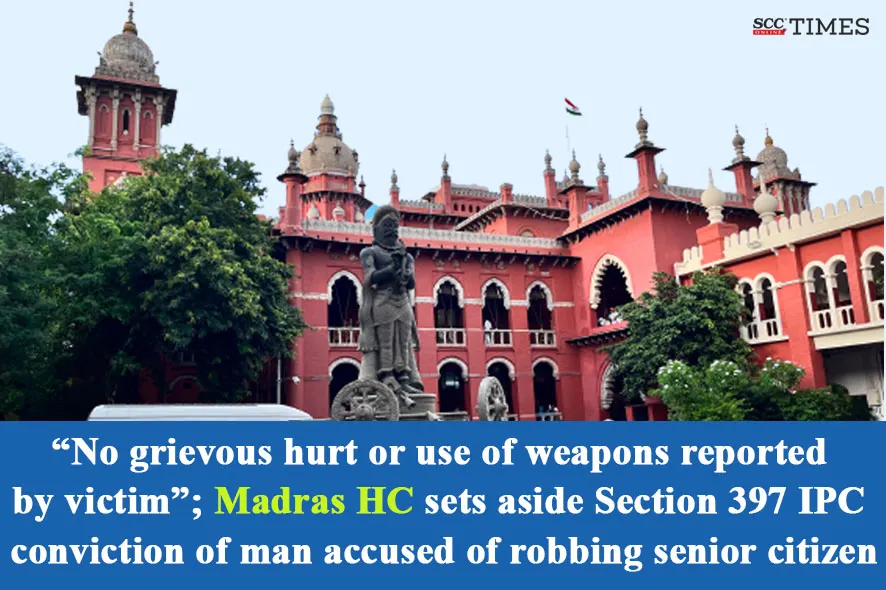Madras High Court: In the present appeal, the appellant-accused sought to set aside the Trial Court’s judgment for an alleged robbery involving theft of jewellery and cash from a senior citizen contending false implication and inconsistencies in witness statements and flaws in identification, including that the complainant-victim had seen him at the police station before the parade and other witnesses did not support her identification. A Single Judge Bench of M. Nirmal Kumar, J., while partly allowing the appeal, set aside the accused’s conviction under Sections 392 read with 397 of the Penal Code, 1860 (‘IPC’), holding that the victim had not reported grievous hurt or threat to life, and neither the appellant-accused nor the absconding accused had used any arms or weapons. However, the accused was convicted under Sections 392 read with 394 of the IPC, since there was no suggestion to the victim as to why she would falsely enact a drama or give a false complaint.
Background:
The case arose from an incident that took place on 15-12-2009 at around 7:30 a.m., when the victim was alone at home, engaged in kitchen work. A young man appeared at her kitchen window and claimed that he needed to meet the house owner upstairs. Shortly thereafter, someone banged on the door and asked for her husband by name. Assuming it was someone familiar, she opened the door and was immediately pushed inside by two men. They tied her mouth and hands with towels, demanded jewellery, and searched two bureaus, finding Rs 500 and Rs 6,000 respectively. When no gold was found, they snatched her Thali chain and bangles, tied her to a chair, and fled the scene. She managed to free herself, alerted the house owner and her son, who then called the police. Thereby, a complaint was lodged, and an FIR was registered.
On 24-01-2010, the police received information about the presence of the accused near Medavakkam Tank Road. Accordingly, both accused were arrested and confessed to the offence. Based on their disclosure, stolen jewellery was recovered from shops in T. Nagar. Further, the victim later identified the accused in a test identification parade. As one of the accused had absconded, the case was split.
During trial, the accused contended that he was falsely implicated, pointing to inconsistencies in witness statements and flaws in the identification process. It was highlighted that the victim had already seen the accused at the police station before the parade, and other witnesses did not corroborate her identification. It was further alleged that the jewellery shop owners were not examined, and one key witness’s testimony remained incomplete.
Analysis and Decision:
Upon considering the submissions and perusing the material, the Court observed that there were some contradictions regarding the way the complaint was lodged. The Court noted that the victim stated her cousin took her to the police station and the complaint was given, whereas the house owner confirmed that he had immediately dialled 100 and informed higher police officials before leaving, and that the victim had gone to the police station with her cousin. The Court found a minor variance in the timing of reaching the police station.
Further, the Court highlighted that the victim was clear and categorical in stating that two persons had entered the house at about 7.30 a.m., tied her, snatched her Thali chain, removed her bangles, and left. Thereafter, she managed to come out, rang the calling bell of the house owner, who came out immediately and informed the police. These facts, the Court held, clearly proved the occurrence and confirmed that the information to the police was given within one hour, with no laxity of time. Moreover, the Court noted that there was no suggestion to the victim as to why she would falsely enact a drama or give a false complaint. The victim clearly gave details of the age and appearance of the accused.
In addition, the Court observed that the victim was an elderly person who would have been in a state of shock, since such an incident does not happen to everyone. The Court emphasised that it was a rare incident, which became embedded in the mind and could not be forgotten.
Additionally, the Court noted that the arrest and confession had been recorded in the presence of a witness. The Court observed that, no doubt, the jewellery shop owners were neither shown as receivers of stolen property nor examined as witnesses in this case. However, the Court held that this did not completely invalidate the victim’s case. In this context, the Court noted that nothing had been suggested to explain why the victim would falsely implicate the accused in this case.
However, with regard to the conviction by the Trial Court under Sections 392 read with 397 IPC, the Court found that there had been no attempt to cause death or grievous injury. The Court highlighted that the victim had not reported sustaining grievous hurt or any threat to her life, and in fact, she had not even been referred to any doctor for treatment. Admittedly, in this case, the Court held that neither the appellant-accused nor the absconding accused had been found to have used any arms or weapons.
Consequently, the Court found that the conviction of the accused under Section 392 read with 397 IPC was not sustainable and accordingly set it aside. Instead, the accused was convicted under Sections 392 read with 394 IPC. The Court further concluded that the accused had no previous antecedents and no other case against him, and since he had remained in prison for 104 days during remand and 1045 days after conviction, totalling 1149 days, the sentence was modified to the period already undergone.
[R. Suresh v. State of TN, 2025 SCC OnLine Mad 8492, decided on 08-10-2025]
Advocates who appeared in this case:
For the Appellant: P. Pugalenthi
For the Respondent: L. Baskaran



